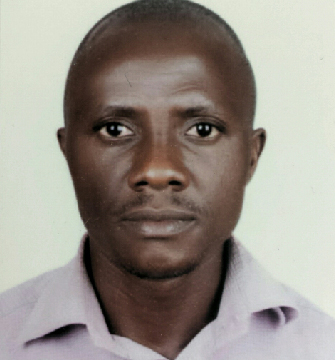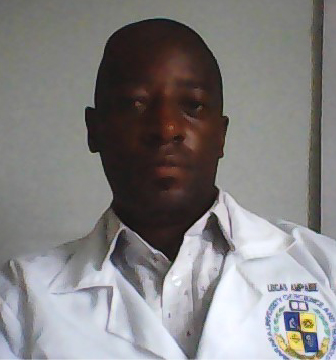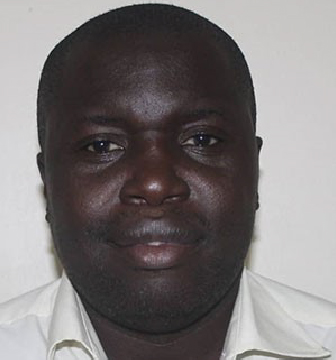Herbert Itabangi
I am a mycologist, an EDCTP fellow at Mbarara University of science and Technology and a Senior Lecturer at Busitema University, Faculty of health sciences department of microbiology and Immunology. My research interests focus on cross kingdom synergy. In particular employing several infection models such as Amoebae, Zebrafish, Galleria, Mice or Macrophages to investigate the impact of fungal -bacterial interactions. I am currently the PI on this EDCTP-MeMoF project which focuses on metabolic and molecular ecological evolution of opportunistic pulmonary fungal co-infections in patients with HIV/AIDS.
Herbert Itabangi
Senior Lecturer
I am a mycologist, an EDCTP fellow at Mbarara University...
Ampaire M. Lucas
Lucas is a Medical Microbiologist and Lecturer for Medical and diagnostic microbiology in the department of Medical Laboratory Sciences, Faculty of Medicine, Mbarara University of Science and Technology (MUST), Mbarara, Uganda. He is a SIDA Fellow. His expertise is in microbiological and molecular analysis. He has coordinated a postgraduate training in the department of Medical Laboratory Sciences, and is a member of the Post graduate committee of the Faculty of Medicine. To date, Lucas has mentored a good number of undergraduate and Masters’ students in the field of microbiology, Mycology, infectious diseases, water and sanitation and public health. His research interests are wide but include the epidemiology of infectious diseases, Antimicrobial resistance, Diagnostics development. He has contributed to and co-authored more than 20 scientific articles. I am currently a Research Associate on the EDCTP-MeMoF Project.
Ampaire M. Lucas
Mbarara University of Science and Technology
Lucas is a Medical Microbiologist and Lecturer for Medical and...
Kennedy Kassaza
Kennedy Kassaza is a Ugandan basic scientist with a passion in Molecular microbiological investigations on how differences in pathogen genotype influence host immune system, his academic training includes among others, Diploma in Medical Laboratory Techniques from Jinja School of laboratory Technology (2005), undergraduate degree in medical Laboratory science at Mbarara University of Science and Technology, MUST, (2013), Master of Science (MSc) in Microbiology, MUST, (March 2016) and currently, a PhD candidate in the department of Microbiology, MUST. For His MSc thesis, Kennedy provided proof of principle that archived malaria blood smears from prior field epidemiology studies can be used as sources of DNA for future molecular diagnostic testing. He extracted DNA blood smears and paired blood pellets and then used PCR followed by High Resolution Melting to determine the infecting Plasmodium species and compared the performance of this method to the gold standard of prior microscopy. His PhD research is focused on developing a molecular assay to stratify Cryptococcus neoformans infection based on pathogen’s genotypic characteristics. Kennedy’s contribution to the EDCTP-MeMoF study will be in the area of laboratory management and testing of study samples. He will be responsible for all the laboratory analyses and laboratory consumables order initiation at MUST. He is also deeply involved in developing some key study documents including S.O.Ps, forms and charts
Kennedy Kassaza
Mbarara University of sciences and Technology
Kennedy Kassaza is a Ugandan basic scientist with a passion...
Prof. Joel Bazira
Is an Associate Professor, and Head of the department of Microbiology, Faculty of Medicine, Mbarara University of Science and Technology (MUST), Mbarara, Uganda. He is a Fulbright Fellow. His expertise is in microbiological and genetic analysis. He has coordinated a postgraduate training in the Faculty of Medicine and established an MSc in Medical Microbiology at MUST. He has written over 40 articles and supervised over 10 graduate students. He has also conducted TB studies that showed the majority of tuberculosis cases in South Western Uganda were probably due to reactivation and not ongoing transmission which made giving of Anti-retroviral drugs to HIV patients to support the immune system the best way to prevent TB in this region. He has been involved in the campaign against antimicrobial resistance (AMR) through studies conducted in Mbarara. These studies have contributed to a UNAS report entitled “Antibiotic Resistance in Uganda: Situation Analysis and Recommendations”. That report was the basis for Uganda’s AMR National Action Plan. In 2017, he organised the 2nd national AMR conference in Mbarara to raise awareness of the AMR. He has conducted several studies on neonatal sepsis to try to understand the aetiology of neonatal sepsis. These studies have redefined the cause of neonatal sepsis in Uganda and now we are working on understanding the neonatal septisome and how we can predict it. Joel is currently the mentor to the EDCTP-MeMoF fellow and advisor to the project the team.
Prof. Joel Bazira
Mbarara University of Science and Technology
Is an Associate Professor, and Head of the department of...
Jacob Stanley Iramiot
Jacob Stanley Iramiot is a Lecturer of Microbiology and Immunology at Busitema University Faculty of Health Sciences (BUFHS). He is currently acting Chair, Department of Microbiology and Immunology. To date, he has mentored a good number of undergraduate and masters’ students in the field of microbiology, infectious diseases, and public health. His research interests include the epidemiology of infectious diseases, molecular epidemiology of multi-drug resistant pathogens and other pathogens of public health importance, and a one health approach to antimicrobial resistance. He has contributed to and co-authored more than 30 scientific articles. I am currently a collaborator on the EDCTP-MeMoF Project
Jacob Stanley Iramiot
Busitema University
Jacob Stanley Iramiot is a Lecturer of Microbiology and Immunology...
Dr Jason King
I am a cell biologist at the University of Sheffield using the amoebae Dictyostelium to understand phagocyte biology. In particular, we use this as an experimentally amenable model of macrophages and study how they interact with pathogenic bacteria and fungi. In this project we provide expertise in the how phagocytes kill microbes and support the development of local studies investigating how clinical fungal isolates interact with environmental amoebae. I am a collaborator on the on-going EDCT-MeMoF project at Mbarara University.
Dr Jason King
University of Sheffield
I am a cell biologist at the University of Sheffield...
Dr Elizabeth Ballou, PhD
Liz, is a cell biologist and geneticist studying morphological transitions in human fungal pathogens. Her research interests are wide-ranging, but she is particularly interested in how fungi integrate environmental signals to undergo morphological changes underpinning pathogenesis. She earned her PhD at Duke University with Andy Alspaugh studying Cryptococcus neoformans morphogenesis and postdoc’d with the Aberdeen Fungal Group at the University of Aberdeen, where she studied Candida albicans host-pathogen interactions. In 2017 she moved to the University of Birmingham, UK, where she launcher her lab studying Cryptococcus titan cells and Rhizopus morphogenesis. Throughout her career, Liz has benefited from the guidance and advice of numerous mentors and seeks to pay this forward to the next generation of scientists. Liz is currently collaborating with Dr Herbert Itabangi on the EDCTP-MeMoF project doubling as technical advisor as well.
Dr Elizabeth Ballou, PhD
University of Exeter
Liz, is a cell biologist and geneticist studying morphological transitions...
Professor Robin C May
Robin May is Professor of Infectious Diseases and a UK Government Chief Scientific Advisor. He is internationally recognised for his work investigating host-pathogen interactions, particularly in the area of life-threatening opportunistic infections. Much of Robin’s work has focused on the fatal fungal disease cryptococcosis. In 2009 he discovered the virulence mechanism underpinning the so-called ‘Pacific Northwest Outbreak’ – the largest outbreak of life-threatening primary fungal infections in history. Together with international colleagues, he then characterised the evolutionary trajectory of the outbreak strain and went on to show how it relies on a unique microbial “Division of Labour” mechanism driven through the exchange of extracellular vesicles – a discovery that offers the prospect of a novel route to therapy. In parallel, working closely with clinical collaborators, Robin has shown how fungal strain variation influences dissemination in HIV+ patients. In 2006, his group discovered ‘vomocytosis’ – a previously unknown phenomenon in which white blood cells eject live pathogens, which has major implications for a wide range of immunological disorders. Robin’s team subsequently revealed the underlying molecular mechanism and, last year, showed how it enables immune cells to ‘reprioritise’ when dealing with co-infections. Robin’s contributions have been recognised by awards including a Lister Fellowship (2010), Colworth Medal (2013), ERC Consolidator Award (2014), Royal Society Wolfson Merit Award (2015) and Fellowship of the American Academy of Microbiology (2019). He was Director of the Institute of Microbiology & Infection from 2017-20 and serves on several advisory committees, including the UK Scientific Advisory Committee on Genetic Modification. He has been heavily involved in science communication, including regular media appearances addressing public concerns during the COVID-19 pandemic. This background in science advice and communication led to his appointment earlier this year as Chief Scientific Advisor to the Food Standards Agency. Robin is a technical advisor and collaborator on the EDCTP-MeMoF project.
Professor Robin C May
University of Birmingham
Robin May is Professor of Infectious Diseases and a UK...









